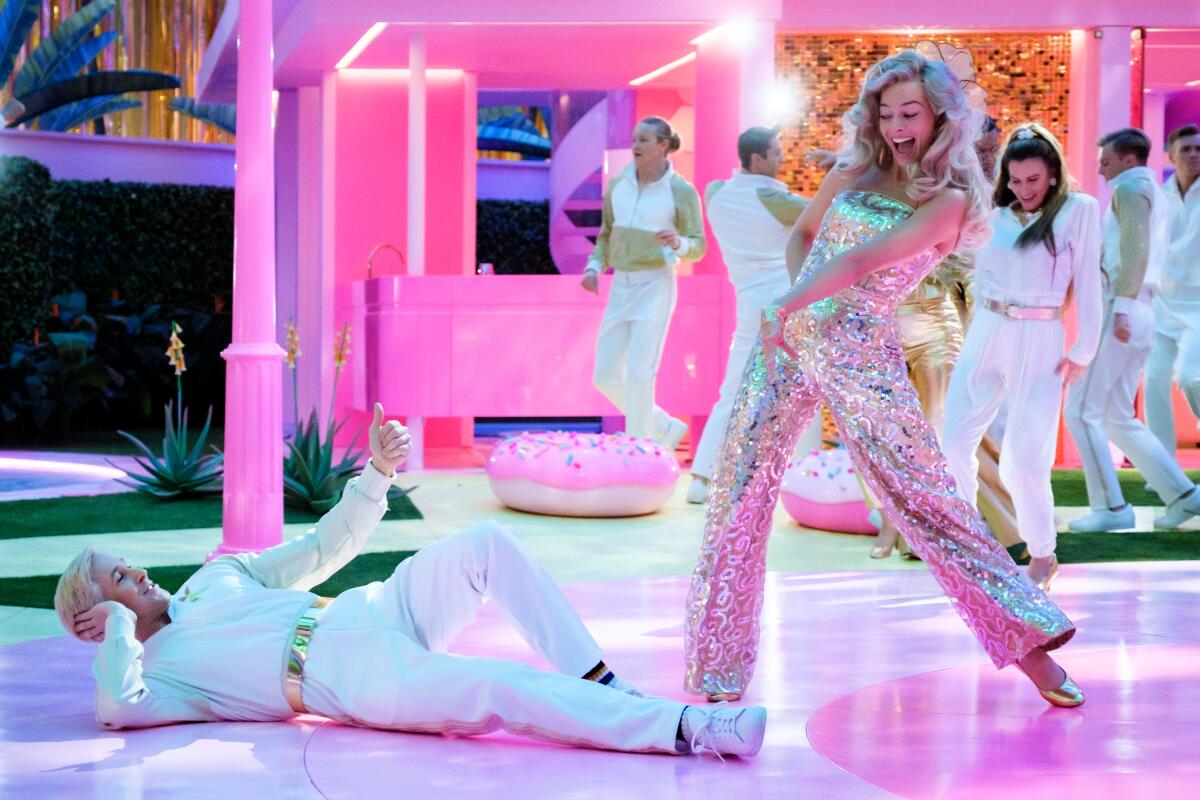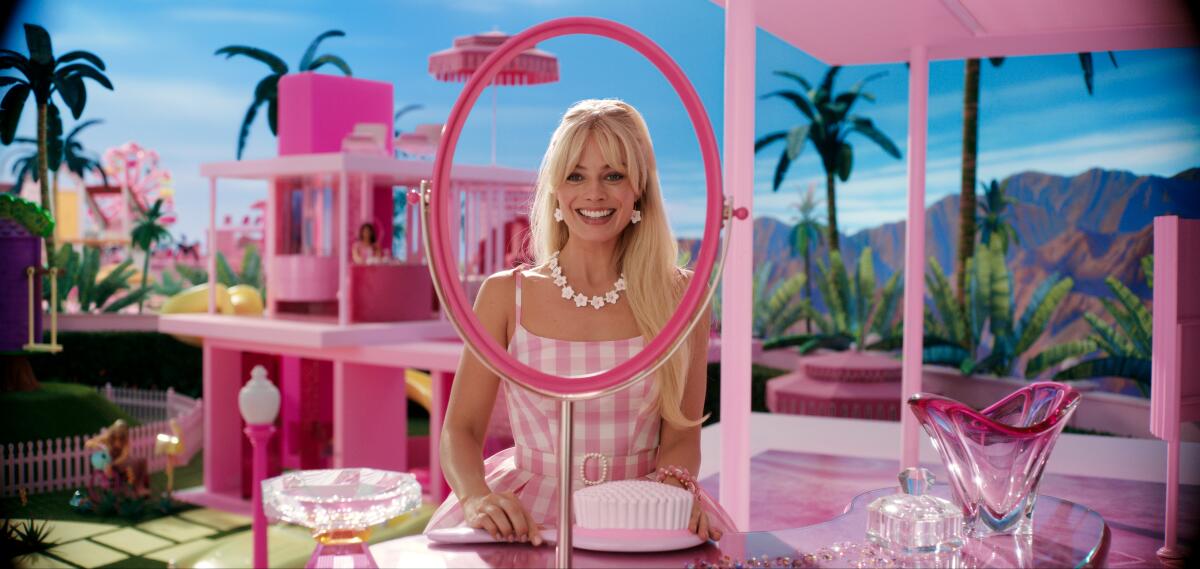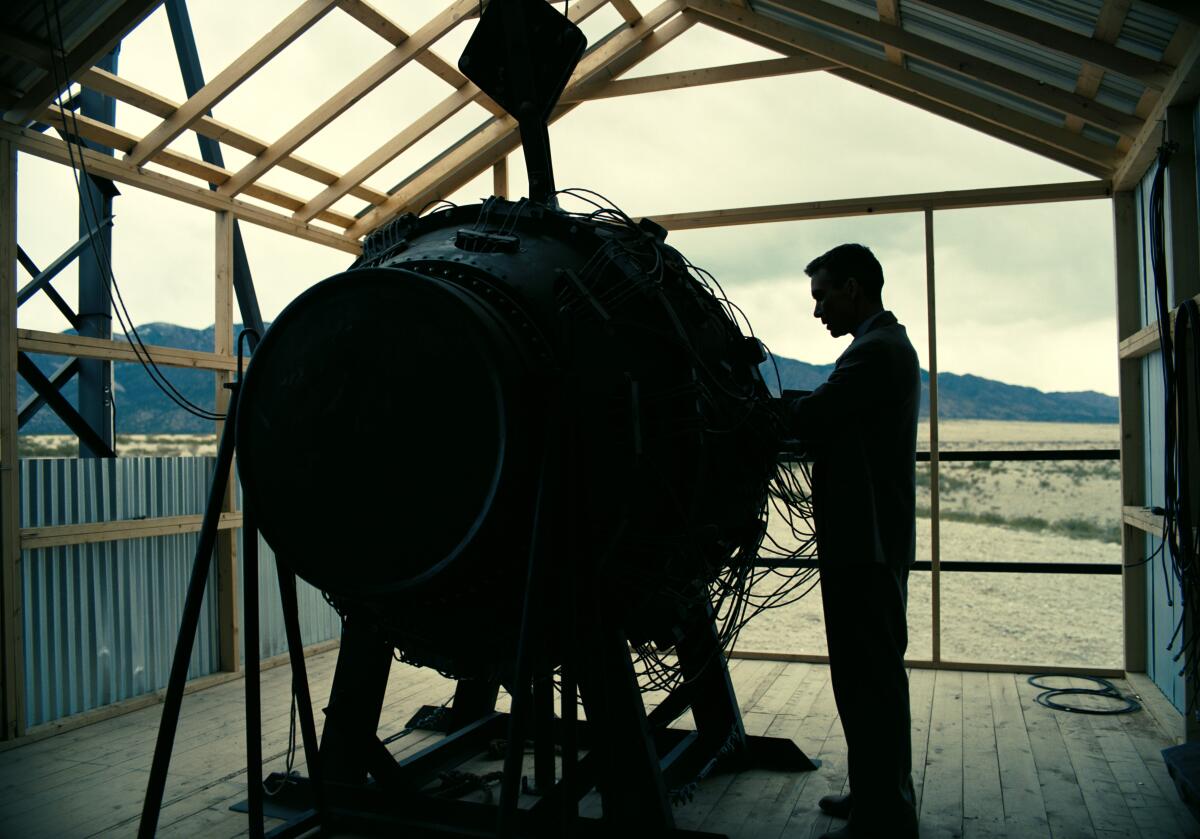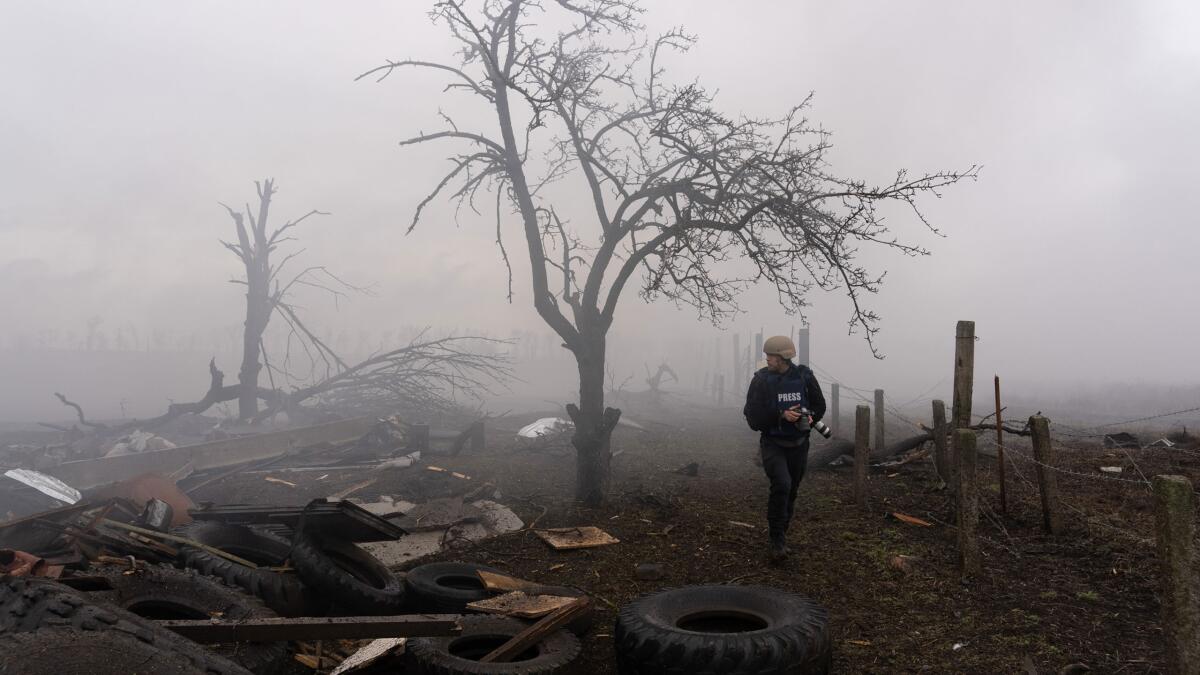‘Oppenheimer’ or ‘Barbie’? Obviously it’s yes to both

Hello! I’m Mark Olsen. Welcome to another edition of your regular field guide to a world of Only Good Movies.
As the actors’ strike enters its second week, SAG-AFTRA is trying to make it clear just how far apart both sides are on many key issues. As Anousha Sakoui reported, the union released a 12-page document outlining its demands and the studios’ response.
Our Mary McNamara took a step back to assess how this all looks, noting, “Honestly, watching the studios turn one strike into two makes you wonder whether any of their executives have ever seen a movie or watched a television show. Scenes of rich overlords sipping Champagne and acting irritated while the crowd howls for bread rarely end well for the Champagne sippers.”
Finally, an Embarrassment doc When I was growing up in Kansas, it could seem like a real cultural wasteland, from which nothing interesting could ever come. But people a few clicks older and cooler than me, like the manager at a video store where I worked the counter, spoke of an early-’80s band from Wichita called the Embarrassment in hushed, mythic tones. In the band’s brief career, it played a jittery, danceable punk-adjacent rock that, in a better world, would have positioned them alongside R.E.M. and Mission of Burma.
A documentary on the band, “We Were Famous, You Don’t Remember: The Embarrassment” directed by Daniel Fetherston and Danny Szlauderbach, is having its California premiere on Thursday at Brain Dead Studios on Fairfax. The movie is full of incredible footage of the band (a rendition of Michael Jackson’s “Don’t Stop ‘Til You Get Enough” for a handful of children in a backyard is epic stuff) with wry, warmly reflective interviews from the members themselves. The doc is an inspiring reminder that creativity can sprout anywhere.
Jean Eustache series concludes One of the best experiences I have had at the movies recently was seeing Jean Eustache’s second fiction feature, 1974’s “My Little Loves,” an unsparing portrait of adolescence that deserves to be thought of alongside François Truffaut’s “Spare Change” and Wes Anderson’s “Moonrise Kingdom.” Long known primarily for his epic portrait of post-1968 disillusionment, “The Mother and the Whore,” Eustache is getting a wider reappraisal via a traveling retrospective. Playing locally at the American Cinematheque, the series concludes on Wednesday with 1977’s “A Dirty Story,” starring Michael Lonsdale, and the 1980 short film “Alix’s Pictures,” which would posthumously win the filmmaker a César Award following his death by suicide in 1981.
Dick Smith at the academy The Academy Museum has launched a series celebrating the work of pioneering makeup artist Dick Smith, running through Aug. 24. Having launched Thursday night with a screening of “The Godfather” — Smith was responsible for transforming Marlon Brando into Vito Corleone — there are still several stunning movies to come, including “The Exorcist” (July 27), “Altered States,” (Aug. 3), “The Hunger” (Aug 17) and “Amadeus” (Aug. 24), the last of which earned Smith and Paul LeBlanc an Academy Award.
Enjoying this newsletter? Consider subscribing to the Los Angeles Times
Your support helps us deliver the news that matters most. Become a subscriber.
‘Barbie’
At last “Barbenheimer” is upon us: the weekend when both “Barbie” and “Oppenheimer” are released. There’s been something so joyful in seeing people get excited about not one, but two new movies, and also that, for the most part, fans have not pitted the films against each other. Rather, there seems to be a sense that true movie fans can groove on both frequencies.
Directed by Greta Gerwig, who co-wrote the script with her life partner and frequent collaborator Noah Baumbach, “Barbie” is a wildly mischievous film: funny and satirical but with a bracing sincerity and full-fledged emotions. Barbie (Margot Robbie) ventures from Barbie Land to the Real World hoping to find the cause of her recent thoughts of death. Her adoring but neglected boyfriend Ken (Ryan Gosling) tags along and makes some discoveries of his own. The cast also includes Issa Rae, Will Ferrell, America Ferrera, Kate McKinnon and Simu Liu.
In his review, Justin Chang wrote, “Whatever you think of ‘Barbie,’ the mere existence of this smart, funny, conceptually playful, sartorially dazzling comic fantasy speaks to the irreverent wit and meta-critical sensibility of its director. (It also owes something, I suppose, to Mattel’s willingness to endure some modestly scathing satire in the pursuit of ever-greater profits.) Working again with her co-writer, Noah Baumbach (‘Mistress America,’ ‘Frances Ha’), Gerwig has conceived ‘Barbie’ as a bubble-gum emulsion of silliness and sophistication, a picture that both promotes and deconstructs its own brand. It doesn’t just mean to renew the endless ‘Barbie: good or bad?’ debate. It wants to enact that debate, to vigorously argue both positions for the better part of two fast-moving, furiously multitasking hours.”
Yvonne Villarreal spoke to America Ferrera, who as one of the movie’s main human characters in the real world becomes something of a secret weapon, delivering an emotional monologue that thematically defines the film.
Fererra recalled encountering that monologue when she told us, “When I first read it, it just hit me as the truth. There’s no woman in my life who those words aren’t true for. Not a single one. So it felt like a gift. And it felt very intimidating, because Greta was like, ‘I hope you enjoy the script. Also, there’s a monologue that Meryl Streep said she’d like to do, but it’s for your character. So, enjoy.’ And I’m like, ‘What?’”
I spoke to Gerwig and Gosling about the film’s conception of Ken, how he goes through a personal crisis of identity and comes out the other side a better person. He was reluctant to get into specifics of what it meant to him personally to present a portrait of someone overcoming traditional codes of masculinity, saying only, “She gave me this opportunity to articulate myself in the best way I can, which is in my work. So I was really grateful for that.”
As to stuffing a heady, philosophical treatise into a pink pop confection, Gerwig said, “It was insane, from top to bottom. How we were doing it was crazy. What we were doing was bananas. And then also the core of it was this heady thing, but it was also a confection. But then I thought, ‘Well, they’re so great and all of this is so great and I’m enjoying it. Maybe other people will?’”

‘Oppenheimer’
Written and directed by Christopher Nolan, “Oppenheimer” follows the life of the scientist J. Robert Oppenheimer, the theoretical physicist who was pivotal in developing the atomic bomb. In a movie that feels both epic in scale and unexpectedly intimate in its emotions, Nolan casts Cillian Murphy in the title role, leading a sprawling cast that includes Emily Blunt, Florence Pugh, Robert Downey Jr., Matt Damon and many more. The film is in theaters now.
Justin Chang reviewed the film, writing: “But Nolan, once again bending narrative and chronology to his will, is after something more elusive than a simple three-act trajectory. He is also less interested in reenacting scenes of mass death and devastation, none of which are depicted here, than in sifting through the bomb’s lingering geopolitical and psychic residue. For much of its three-hour running time, this swift and supercharged movie keeps its designs largely hidden beneath a series of formal eruptions. It leaps between time frames and perspectives, color and black-and-white, crowded classrooms and wide-open desert vistas, and even between aspect ratios, if you’re fortunate enough to see it in Imax. … The point of these convulsions is hardly to confuse or overwhelm the viewer, as Nolan is often accused of doing, but rather to suggest something of its subject’s sweeping intellectual grandeur and complicated, often contradictory essence.”
The mighty Kenneth Turan spoke to Nolan about the film, who said of the film’s close-up and intimate view of Oppenheimer’s life, “We don’t want to judge him, we want to be him, we want to be swept up in his life, to see the world through his eyes. In film we don’t often get the opportunity to drill down on these particular moments. Do we know exactly why we do things? Oppenheimer was an extreme form of what we all do.”
David Amsden wrote about the adaptation of the book “American Prometheus: The Triumph and Tragedy of J. Robert Oppenheimer,” the 721-page biography of Oppenheimer on which Nolan’s film is based. Written by Kai Bird and Martin J. Sherwin, the book took some 25 years to research and write, eventually being published in 2005. (Sherwin passed away in 2021.) As Bird said of seeing the book turned into a film, “It was all very slow, until suddenly one day it wasn’t.”

‘20 Days in Mariupol’
Directed by journalist Mstyslav Chernov, the documentary “20 Days in Mariupol” plunges viewers into on-the-ground coverage of the Russian invasion of Ukraine. As he told The Times’ Matt Brennan when the film premiered earlier this year at Sundance: “This is a historical war. To not document it is impossible.” The film is playing now exclusively at the Laemmle Monica.
In our review, Robert Abele wrote, “The reality of what the war is like for targeted Ukrainians is a grim truth that’s all too readily sidelined as the months drag on. Which is why Mstyslav Chernov’s immersive, shattering documentary recounting the invasion’s first weeks, ’20 Days in Mariupol,’ is a brutal, necessary, heart-pounding reminder of why the siege shocked the world, and what remains at stake whether you’re staying apprised or not. Acrid and harrowing, it’ll slap you awake.”

Only good movies
Get the Indie Focus newsletter, Mark Olsen's weekly guide to the world of cinema.
You may occasionally receive promotional content from the Los Angeles Times.




